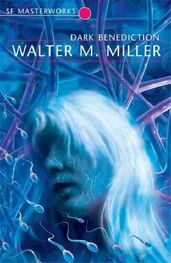But she had only just now been born.
And you’re somehow different, too, Zerchi noticed with a trace of awe. He remembered that Mrs. Grales had arthritis in both knees, but the body which had belonged to her was now kneeling there and sitting back on its heels in that limber posture of youth. Moreover, the old woman’s wrinkled skin seemed less wrinkled than before, and it seemed to glow a little, as if horny old tissue were being revivified. Suddenly he noticed her arm.
“You’re hurt!”
“you’re hurt.”
Zerchi pointed at her arm. Instead of looking where he pointed, she imitated his gesture, looking at his finger and extending her own to touch it — using the wounded arm. There was very little blood, hut there were at least a dozen cuts and one looked deep. He tugged at her finger to bring her arm closer. He plucked out five slivers of broken glass. Either she had thrust her arm through a window, or, more likely, had been in the path of an exploding windowpane when the blast had come. Only once when he removed an inch-long lance of glass did a trace of blood appear. When he pulled the others free, they left tiny blue marks, with no bleeding. The effect reminded him of a demonstration of hypnosis he had once witnessed, of something he had dismissed as a hoax. When he looked up at her face again, his awe increased. She was still smiling at him, as if the removal of the glass splinters had caused her no discomfort.
He glanced again at the face of Mrs. Grales. It had grown gray with the impersonal mask of coma. The lips seemed bloodless. Somehow he felt certain it was dying. He could imagine it withering and eventually falling away like a scab or an umbilical cord. Who, then, was Rachel? And what?
There was still a little moisture on the rain-wet rocks. He moistened one fingertip and beckoned for her to lean closer. Whatever she was, she had probably received too much radiation to live very long. He began tracing a cross on her forehead with the moist fingertip.
“Nisi baptizata es et nisi baptizari nonquis, te baptizo…”
He got no farther than that. She leaned quickly away from him. Her smile froze and vanished. No! her whole countenance seemed to shout. She turned away from him. She wiped the trace of moisture from her forehead, closed her eyes, and let her hands lie limply in her lap. An expression of complete passivity came over her face. With her head bowed that way, her whole attitude seemed suggestive of prayer. Gradually, out of the passivity, a smile was reborn. It grew. When she opened her eyes and looked at him again, it was with the same open warmth as before. But she glanced around as if searching for something.
Her eyes fell on the ciborium. Before he could stop her, she picked it up. “No!” he coughed hoarsely, and made a grab for it. She was too quick for him, and the effort cost him a blackout. As he drifted back to consciousness and lifted his head again, he could see only through a blur. She was still kneeling there facing him. Finally he could make out that she was holding the golden cup in her left hand, and in her right, delicately between thumb and forefinger, a single Host. She was offering it to him, or was he only imagining it, as he had imagined awhile ago that he was talking to Brother Pat?
He waited for the blur to clear. This time it wasn’t going to clear, not completely. “Domine, non sum dignus…” he whispered, “sed tantum die verbo . . ,”
He received the Wafer from her hand. She replaced the lid of the ciborium and set the vessel in a more protected spot under a jutting rock. She used no conventional gestures, but the reverence with which she had handled it convinced him of one thing: she sensed the Presence under the veils. She who could not yet use words nor understand them, had done what she had as if by direct instruction, in response to his attempt at conditional baptism.
He tried to refocus his eyes to get another look at the face of this being, who by gestures alone had said to him: I do not need your first Sacrament, Man, but I am worthy to convey to you this Sacrament of Life. Now he knew what she was, and he sobbed faintly when he could not again force his eyes to focus on those cool, green, and untroubled eyes of one born free.
“Magnificat anima mea Dominum,” be whispered. “My soul doth magnify the Lord, and my spirit hath rejoiced in God my Saviour; for He hath regarded the lowliness of His handmaid…” He wanted to teach her these words as his last act, for he was certain that she shared something with the Maiden who first had spoken them.
“Magnificat anima mea Dominum et exultavit spiritus meus in Deo, salutari meo, quia respexit humilitatem . . ,”
He ran out of breath before be had finished. His vision went foggy; he could no longer see her form. But cool fingertips touched his forehead, and he heard her say one word:
“Live.”
Then she was gone. He could hear her voice trailing away in the new ruins. “la la la, la-la-la…”
The image of those cool green eyes lingered with him as long as life. He did not ask why God would choose to raise up a creature of primal innocence from the shoulder of Mrs. Grales, or why God gave to it the preternatural gifts of Eden — these gifts which Man had been trying to seize by brute force again from Heaven since first he lost them. He had seen primal innocence in those eyes, and a promise of resurrection. One glimpse had been a bounty, and he wept in gratitude. Afterwards he lay with his face in the wet dirt and waited.
Nothing else ever came — nothing that he saw, or felt, or heard.
They sang as they lifted the children into the ship. They sang old space chanteys and helped the children up the ladder one at a time and into the hands of the sisters. They sang heartily to dispel the fright of the little ones. When the horizon erupted, the singing stopped. They passed the last child into the ship.
The horizon came alive with flashes as the monks mounted the ladder. The horizons became a red glow. A distant cloudbank was born where no cloud had been. The monks on the ladder looked away from the flashes. When the flashes were gone, they looked back.
The visage of Lucifer mushroomed into hideousness above the cloudbank, rising slowly like some titan climbing to its feet after ages of imprisonment in the Earth.
Someone barked an order. The monks began climbing again. Soon they were all inside the ship.
The last monk, upon entering, paused in the lock. He stood in the open hatchway and took off his sandals. “ Sic transit mundus,” he murmured, looking back at the glow. He slapped the soles of his sandals together, beating the dirt out of them The glow was engulfing a third of the heavens. He scratched his beard, took one last look at the ocean, then stepped back and closed the hatch.
There came a blur, a glare of light, a high thin whining sound, and the starship thrust itself heavenward.
The breakers beat monotonously at the shores, casting up driftwood. An abandoned seaplane floated beyond the breakers. After a while the breakers caught the seaplane and threw it on the shore with the driftwood. It tilted and fractured a wing. There were shrimp carousing in the breakers, and the whiting that fed on the shrimp, and the shark that munched the whiting and found them admirable, in the sportive brutality of the sea.
A wind came across the ocean, sweeping with it a pall of fine white ash. The ash fell into the sea and into the breakers. The breakers washed dead shrimp ashore with the driftwood. Then they washed up the whiting. The shark swam out to his deepest waters and brooded in the cold clean currents. He was very hungry that season.






